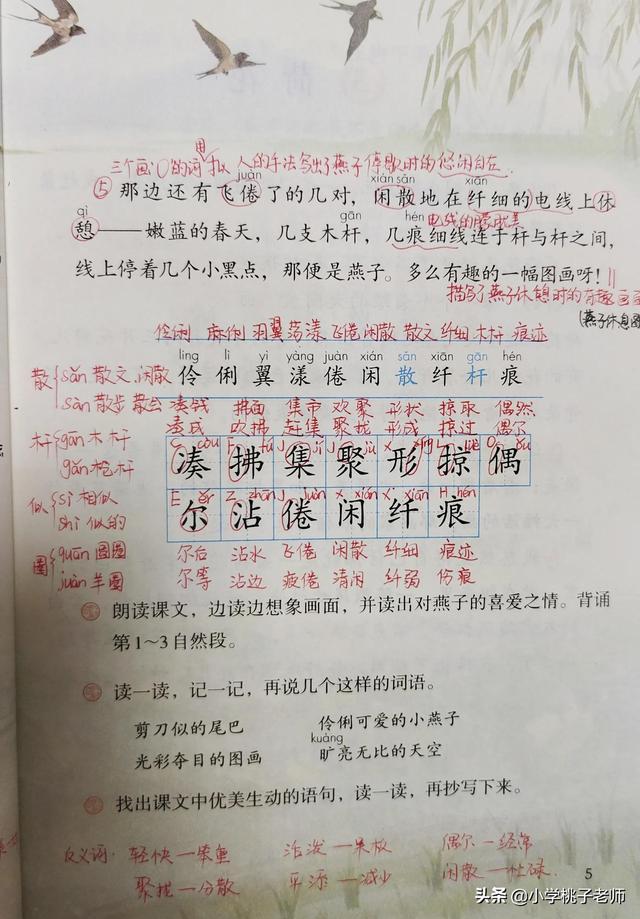英语近义词的差异(英文意思相近用法却不同的近义词汇总)
英文中有很多常用短语意义相近却不相同,常常出现在考试中,一不小心就会选错或用错,今天老师就为大家总结了用法不同的近义词/词组,这也是英文学习的重点,希望大家可以在学习中理解、对比记忆在考试中千万不要用错,我来为大家科普一下关于英语近义词的差异?下面希望有你要的答案,我们一起来看看吧!

英语近义词的差异
英文中有很多常用短语意义相近却不相同,常常出现在考试中,一不小心就会选错或用错,今天老师就为大家总结了用法不同的近义词/词组,这也是英文学习的重点,希望大家可以在学习中理解、对比记忆在考试中千万不要用错!
1
happen , take place
二者都有“发生”的意思。
happen指事情的发生,往往带有"偶然"的意思。
It happens that I am free today. 恰好今天我没有事。
take place指事先安排或策划好而后发生,没有"偶然"的意思。
2
must, have to
must表示说话人的主观看法;而have to则表示客观需要。mustn t意为“不可以;不允许”;don t have to意为“不必”。如:
(1)My father had to work when he was ten years old.
(2)The play is not interesting. I really must go now.
arrive , reach , get to
t to
三者都有“到达”之意。
reach为及物动词。They reached Tianjin yesterday.
昨天他们到达天津。
arrive为不及物动词,后面接介词in或at。
get to常用于口语,可代替前二
because , because of
because of
二者均表示“因为”
because是连词,引导状语从句。
We stayed at home because it rained.
因为下雨,我们呆在家。
because of是短语介词,后面接名词性词语。
We stayed at home because of the rain .
因为下雨
in front of, in the front o
in the front of
t of
in front of…意思是"在……前面",指甲物在乙物之前,两者互不包括;其反义词是behind(在……的后面)。
如:He walked in fount of me.
他走在我的前面。
There are some flowers in fount of the house.
房子前面有些花卉。
in the front of 意思是"在某一空间内的前部",即甲物在乙物的范围之内;其反义词是at the back of…(在……范围内的后部)。
如:There is a big desk and a blackboard in the fount of our classroom.
我们的教室前边有一张大桌子和一块黑板。
Our teacher stands in the fount of the classroom.
我们的老师站在教室前。
6
look , see , watch
三者都有“看”的意思。
look是看的过程。
I looked , but saw nothing . 我看了,但什么也没看见。
see是看的结果。
see a film看电影
see a play看戏(话剧)
watch是看移动的事物或定晴地看。
watch a football match看足球比赛。
sometime; sometimes; some time; some
ome time; some times
ome times
sometime是副词,可与过去时或将来时连用,表示"(在过去)某个时候"或"(在将来)某个时候"。
如:I saw him sometime in May。
some time多数情况下作名词短语,意为"一些时间;一些时候";它还可以作副词词组,用来表示一个未肯定的时刻,此时它可与sometime互换。
如:I ll be away for some time.
sometimes是一个表示时间频率的副词,意为"有时候"。
如:Sometimes I help my mother with the housework.
some times是"几次、几倍"之意。
如:They have been th
how long, how often, how fa
w often, how far, how soo
far, how soon
soon
how long意为"多久、多长时间",主要是对一段时间进行提问,答语通常是(for)three days/weeks/months等时间段,它可用于各种时态。
How long do you stay in Beijing every year?
每年你在北京住多久?
how often意为"多久……次、是否经常",用来提问在某一特定的时间进行某个动作的次数,答语通常是always,usually,often,sometimes,once/twice a day/month等。
How often do you get to school very early?
你多久早到校一次?
how far意为"多远",对距离提问时用。How far is that? 那有多远?
how soon意为"还要多久",是对从某个基本时间到将来某动作结束或某动作发生这段时间提问,常用在一般将来时态的句子中,其答语通常是"in 一段时间"。
-How soon can you finish the work? 还要多久你能完成这项工作?
agree with,agre
agree with,agree to,ag
h,agree to,agree on
,agree on
两者都有“同意”、“赞成”的意思。
agree with 后面常接表示人或意见(看法)的名词作宾语。agree with 还有“适合”、“符合”的含义。如:The climate here doesn t agree with him.他不适合这里的气候。
agree to 后面一般接表示提议、办法、计划之类
across , cross, cr
oss , cross, crossing, th
crossing, through, pas
through, past
past
1)cross 意为“横过, 穿过”为动词,相当于walk(go,run)across
Look both ways before you cross the road。
(2)across意为“横过,穿过”为介词,不作动词,不能作谓语,常放在动词之后,如:go across
He walked across the field。
(3)through 是介词,含有“从…中间穿越”之意,表示四周含有物体的穿越。
The ball went through the window。
(4)past既可作形容词也可作副词,做副词时有:“穿过,越过”之意。
Will you be going past my house on your way home?
(5)crossing意为“渡口,人行横道,(铁路与公路的)交叉点。
All the cars should
on,in,with
on,in,with
on,in,with
on,in,with
n,in,with
(1)on:表示使用通讯工具、信息或传媒,乘坐交通工具等;
I don t want to talk about it on the phone.
(2)in:使用语言文字等媒介;
Can you speak it in English?
(3)with:借助具体的手
at,on,in
at,on,in
at,on,in
at,on,in
at,on,in
n,in
at, on, in三者都可以表示"在……的时候"。
(1)at:表示在哪个时刻用;表示时间点。
I get up at six o clock in the morning . 我早晨六点起床。
(2)On:表示在哪一天,哪一天的早上(下午、晚上);
on Wednesday , on Sunday morning , on May I , on a cold morning in 1936
(3)in:表示在哪一年(季、月),在上午,下午等。
in Sep
few, a few; li
few, a fe
few, a few; l
few, a few; little , a
ew; little , a little
a little
虽然都表示“少”,但
·few, a few是可数的, little, a little是不可数的。
·a few, a little含肯定意味,few, little含否定意味。
(1) They have a little ink, don t they?
他们有一点墨水,是吗?
(2)They have little ink, do they?
他们几乎没有墨水,是吗?
(3)She has a few Chinese friends, doesn t she?
他有几位中国朋友,是吗?
(4)She has few Chinese friends, does she?
他
not … until, unti
not … unt
not … until,
not … until,
not … until, unti
… until, until
ntil
not … until 直到…才… (主句动词是短暂性动词)
(1)He didn t go to bed until his mother came back.until 一直到… (主句中使用延续性动词)
(2)I study hard until it is midnight every day.
15. spend, pay, cost, take
(1)Sb. Spend … on sth. 某人花了…(时间、金钱)在某事上。
I spend ten yuan on the book.
(2)spend (in) doing sth. 某人花了…(时间、金钱)做某事。
She spent two hours in drawing the house.
(3)Sb. pay …for …sth. 某人为某物花了…钱。
I paid 50 yuan for the clothes。
(4)Sth. cost sb. … 某物花了某人…钱。
It cost us five dollars。
(5)It takes/took sb. … to do sth. 花了某人…(时间、金钱)做某事。
too much, too man
too much,
too much, too ma
too much, to
too much, too many, mu
too many, much too
much too
too much 不可数名词 too many 可数名词 much too 形容词、副词
(1)There is too much milk in the basket.
(2) She ate too many biscuits yesterday morning.
(3) He run
after , in
i
after , i
after , in
after , in
after , in
after , in
after , in
, in
(1)After 时间段 表达过去一段时间以后,常用于过去时态的句子;
I received the letter after two days .
我是两天以后收到这封信的。
(2)After 时间点 表示将来一段时间以后,用于将来时态的句子。
He will arrive after four o clock.
(3)in 时间段 以现在为起点,表示将来一段时间以后,常用于将来时态的
ago , before
ago , bef
ago , before
ago , before
ago , before
ago , bef
ago , before
, before
(1)ago立足于现在,表示从现在起,若干时间之前;ago 通常与一般过去时连用,不能与完成时连用;
I met him three years ago 。(距今)三年前,我遇到他。
(2)before立足过去,表示从过去某一时刻起,若干时间以前。bef
alone, lonely
alone, lon
alone, lonely
alone, lonel
alone, lonely
alone,
alone, lon
alone, lonely
nely
alone是表语形容词,只能作表语用。
Though I am alone, I am not lonely.虽然我孤独一人,但我并不感到寂寞。
lonely除了有"孤独的"意思外,还有"寂寞的"意思。另外说
also , either ,
also , eith
also , either ,
also , either
also , either , too
also , either ,
either , too , a
, too , as well
, as well
also用于肯定句. You study English and I also study it。
你学英语,我也学。
either用于否定句,并放在句尾;
You don t study English and I don t study it either。
你不学英语,我也不学。
too和as well 用于肯定句,放在句尾,多用于口语。
例如:
You are a student and I am a
as,when,while
as,when,whi
as,when,while
as,when,while
as,when,while
s
as,when,w
as,when
as,when,wh
as,when,while
hile
When:可与一个点的时间或表示一段的时间连用,从句动词可以是短暂性或延续性动词。从句的动作和主句的动作可以同时,也同先于主句的动作。
When the teacher came in,the students stood up.
当老师进来时,学生们起立。
While:只指一段时间,不能指一点时间。因此while从句中的谓语动词必须是延续性动词。表示一段较长的时间或一个过程,主句和从句的动
begin,start
begin,start
begin,start
begin,start
begin,start
和从句
begin,start
begin,star
begin,star
begin,start
gin,start
二者均可表示“开始”
一般可以通用,但start较为口语化。
It has begun(started) raining.已经开始下雨了。
start还可表示“动身”、“开动”等意思,而begin则不能这样用。例如:
They start for Beijing tomorrow。他们明天动身去北京。
23
date,day
date指"日期"。What sthedatetoday?今天几号?
day指"星期几",指二十四小时的一整天;也单指白天;也指重
besides,except,
besides,exc
besides,except,
besides,excep
besides,except,excep
besides,exc
besides,except,ex
s,except,exceptfor
,exceptfor,but“除……之外
for,but“除……之外”
…之外”
besides的意思是"除…之外,还有…"是肯定的;包括,besides后面的宾语在内,含有"加上"的意思。
Ihavethreeotherpensbesidesthis。
除了这支笔外,我还有另外三支笔。
except(but)的意思是"除……之外,没有…"是否定的;不包括except后的宾语在内,含有"减去"的意思。
but用于"除了"之意时,只能用于noone,nobody,nothing,all,everyone,everything等词之后。
Every body is here except(but) Mary.
除了Mary之外,大家都来了。
except for的用法是在说明基本情况后,而在细节上加以纠正。except for有时可以与except互换,表示"除了……之外",但位于句首时,不可以和except互换。例如:
Your composition is good except for some spelling mistakes.除了有几个拼写错误之外,你的作文很好。
besides意为"
bring,take,fetc
bring,take,
bring,take,fetc
bring,take,fe
bring,take,fetch
bring,take,
bring,take,
bring,take
bring,take,fe
bring,take,fetch
ake,fetch
bring是"带来"。
例如:Don t forget to bring adictionary with you.
别忘了把辞典带来。
take是"带去"。
例如:Please take the sma
borrow,lend
borrow,lend
borrow,lend
borrow,lend
borrow,lend
取",
borrow,lend
borrow,lend
borrow,len
borrow,lend
borrow,lend
borrow,lend
lend
二者都有"借"的意
finally,at last
finally,at
finally,at last
finally,at la
finally,at last,in t
finally,at
finally,at
finally,at
finally,at la
finally,at last,in t
,at last,in the end
n the end
它们都有"最后"、"终于"的含义。但用法不同。
finally用于动词之前,表示人们长期以来期待的某事最后实现了。
He tried many times and finally succeeded.
他试验了多次,最后成功了。
at last也有此义,但期待的感情更强烈一些。
At last he has understood it.最后他终于明白了这个。
in the end表示经过许多变化或周折,最后发生了某事。
例如:We made several diffe
find,look for,f
find,look f
find,look for,f
find,look for
find,look for,find o
find,look f
find,look f
find,look
find,look for
find,look for
find,look for,find ou
k for,find out
out
二者都有“寻找”的意思。
find是look for的结果。
What are you looking for?你在找什么?
loo
join,take part
join,take p
join,take part
join,take par
join,take part in,jo
join,take p
join,take p
join,take
join,take par
join,take
join,take part in,j
ake part in,join in
n,join in
二者都有“参加”的意思。
join多指参加某组织、党派或社会团体,成为其中的一个成员。
He joined the League in1985.他在1985年入团。
joinin参加正在进行的竞赛、娱乐、谈话等活动
dress , have st
dress , hav
dress , have st
dress , have
dress , have sth. on
dress , hav
dress , hav
dress , ha
dress , have
dress , have st
, have sth. on , we
sth. on , wear , put o
wear , put on
t on
它们都有"穿"、"戴"的意思。但用法不同。
have sth. on表示穿戴的状态。
He had a straw hat on . 他戴了一顶草帽。
wear表示穿戴的状态。
She likes to wear the light green dress .
她喜欢穿浅绿色的衣服。
put on表示穿戴的动作.
You d
take care of, l
take care o
take care of, l
take care of,
take care of, look a
take care o
take care o
take care of,
take care of,
take care
take care of,
take care of, look
care of, look after
ook after
take care意为“注意”,“当心”,“留心”。可以单独使用,也可以跟不定式或that从句。
Take care!The ice is thin.当心!冰很薄。
take care of意为“照顾”,“照料”,侧重于负有责任这一层意思,后面的宾语从句可以是人,也可以是某物,比较口语化。
Please take care
whether,if
这两个连
whether,if
whether,if
这两个连
whether,if
这两
whether,if
这两个连词都作“是
whether,if
whether,if
whether,if
这两
whether,if
这两
whether,if
whether,if
这两个连词都作“是
r,if
这两个连词都作“是否”解,引导宾语从句
两个连词都作“是否”解,引导宾语从句时,两者通常可以互换
语从句时,两者通常可以互换。
以互换。
但在下列几种情况下,不可用if 代替whether。
1)当whether 与or not连成词组时。
I don t know whether or not they will come for our help.我不知道他们是否来帮助我们。
2)whether 用在不定式前面时。
either ,either…
either ,eit
either ,either…
either ,eithe
either ,either…or, n
either ,eit
either ,eit
either ,ei
either ,eithe
either ,
either ,either…
either ,either…or, neithe
,either…or, neither, neither
ther, neither…nor,
her…nor,
both …and
either其意为“两者中的任何一个”。
There are many shops on either side of the street. 街道两边有许多商店。
either用在否定句的句末,表示"也"的意思。
If you don t go there, I won t, either.
如果你不去那里,我也不去。
either...or...意为"或者……或者……;不是……就是……"之意。表示两者之一,连接句子中两个并列的成分。
either...or...连接两个主语时,其谓语动词应与最近的一个主语在人称和数上保持一致,这就是我们通常说的"就近原则"。
Either you or I am going there tomorrow.
明天要么你去那里,要么我去那里。
neither作主语,表示“两者中没有一个”。
Neither of them likes football. 他们俩都不喜欢足球。
neither...nor...表示“既不……也不……”。其含义是否定的,可连接任意两个并列的成份。
She likes neither butter nor cheese.
她既不喜欢黄油也不喜欢乳酪。
当neither...nor...连接两个主语时,也应遵循“就近原则”。例如:
Neither dad nor mum is at home today.
今天父母都不在家。
若将neither...nor...句型变为肯定句,只需把neither...nor...改为both...and...即可,同时谓语动词必须用复数形式。
例如:Both dad and mum are at home today.
今天父母都在家。
34
have sb.do,have sb. or sth. doing,have sth. done
have sb.do 作"使某人做某事"解,have 后作宾语补足的不定式通常不带 to。
have sb./sth.doing 与 have sb.do 的意思大致相同,只是现在分词作宾补强调动作在进行,而不定式作宾补只表示发生了某件事。试比较下面两个句子:
The boss had his workers working all day long.
那老板让工人们整天(不停地)干活。
The boss had his workers work fourteen hours a day.
那老板让工人们一天干14小时的活。
在 have sb.or sth.doing 结构中,have 如被否定,往往作“允许”、“容忍”解。
如:I won t have you saying such things.
hear,hear of,he
hear,hear o
hear,hear of,he
hear,hear of,
hear,hear of,hear fr
hear,hear o
hear,hear of,h
hear,hear
hear,hear
hear,hea
hear,hear of,he
hear,hear of,hear
hear,hear of,
hear,hear of,hear fro
r of,hear from
from
hear 和hear of 都可解作“听说”,
hear 后面接宾语从句。hear 还可作“听见”,“听到”解,后面可以接名词,代词 不带to的不定式(或分词)的复合结构。
I heard him just now.我刚才听到了他说话。
I heard him singing in the next room.
我听见他在隔壁房间里唱歌。
hear of后面接名词,代词或动名词。I have heard of him。我听人提到过他。
hear from意为“收到……的信”,“得到……消息”。
例如:
How often do you hear from your father?
你每隔多久收到你父亲的信?
注意:hear from的主语是“人”,而不是“信”。
,免责声明:本文仅代表文章作者的个人观点,与本站无关。其原创性、真实性以及文中陈述文字和内容未经本站证实,对本文以及其中全部或者部分内容文字的真实性、完整性和原创性本站不作任何保证或承诺,请读者仅作参考,并自行核实相关内容。文章投诉邮箱:anhduc.ph@yahoo.com






